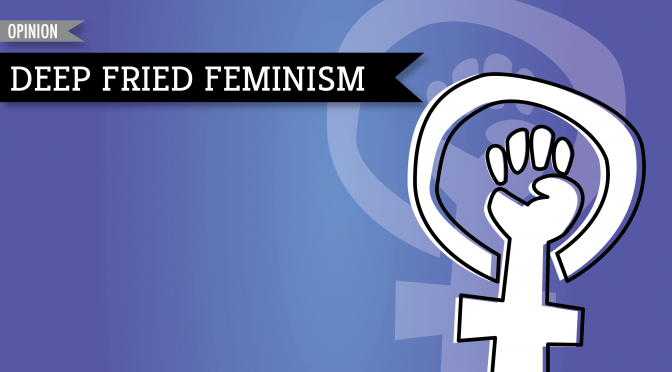
Speak up, ladies
By: Megan Graves, Columnist
“Dave, if I could, I could just — I just really feel like if we had liberty it would be terrific, and the alternative would just be awful, you know? That’s just how it strikes me. I don’t know.”
This is how Washington Post opinion writer Alexandra Petri, feels the historical quote, “give me liberty, or give me death,” would have been said if it were said by a woman in a meeting.
In the article, “Famous quotes, the way a woman would have to say them during a meeting,” (apologies for the repetition) Petri brings up the point made by actress Jennifer Lawrence that when women strongly voice an opinion during an office meeting, the men in the room feel under attack.
Lawrence recalled a time this happened to her, “I spoke my mind and gave my opinion in a clear and no-BS way; no aggression, just blunt.” Her male employee responded with, “Whoa! We’re all on the same team here!” as if Lawrence were attacking him. She goes on to say that she didn’t feel she had said anything, “personal, offensive, or, to be honest, wrong.”
Lawrence concludes her point by stating, “all I hear and see all day are men speaking their opinions, and I give mine in the same exact manner, and you would have thought I had said something offensive.”
Lawrence and Petri aren’t the only women facing this stifling issue. In her TED talk, “Why we have too few women leaders,” Sheryl Sandberg brings up a study conducted by a professor at Columbia University.
The study involved giving a description of an individual who worked their way to the top of the workforce, how they did it and survey responses of what the students thought of that person. The professor offered two descriptions, the only difference being the sex of the person described.
For both surveys, students said the person in description was confident. That’s good. However, when it came to questions like, “Would you want to work for this person/hang out with this person?” the answers were drastically different.
The students loved the male being described; they thought he was a great guy and would love to work for him. The students weren’t so sure about the female. They claimed she was, “too political” and, “out for herself.” To put it bluntly, they thought she was a bitch.
Sandberg concluded her point by stating, “success and likability are positively correlated for men and negatively correlated for women.” Can you say, “double-standard?”
Now, I don’t have the answers to fix this problem. I can’t even tell you why it happens. But, whether we plan on being a part of the workforce or not, we need to be aware that this is happening.
Studies have proven again and again that successful women are not the most liked people. They’re called “bitches” simply for having and stating an opinion.
Sandberg asks us, “What are the messages we tell ourselves? What are the messages we tell the women who work for and with us? What are the messages we tell our daughters?” Well, frankly, we’re telling ourselves and everyone else that women won’t be liked if they have opinions. They won’t be popular if they succeed.
Because of this, “women systematically underestimate their own abilities,” and they, “do not negotiate for themselves in the workforce,” according to Sandber.
In fact, only 7 percent of women entering the workforce out of college will negotiate their starting salary as opposed to 57 percent of men, according to Sandberg’s TED talk.
The best advice out there for how women can solve this problem is for them to stop caring about being liked. We need to stop adding vagueness and uncertainty to our sentiments in order to seem nicer.
We need to own our opinions and never apologize for being right. No one wants to be disliked. But when it comes to success, women need to stop trying to make everyone else feel comfortable and happy.
As Sandberg says, “believe in yourself, negotiate for yourself, own your success.”
Being a powerful woman doesn’t make you a bitch. It makes you strong. If anyone says otherwise, just wait, because us “bitches” are earning our rightful spot in the workforce, and it’s not smart to speak ill of the boss.

